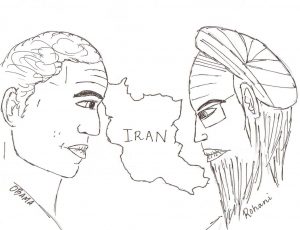Iranian president creating a positive future for his country
November 3, 2013
On Aug. 3 of this year, after winning the popular election in Iran, Hassan Rouhani assumed the role of the president. After 8 years under the poor leadership of former president Mahmoud Ahmadinejad, Iran has finally equipped itself with a leader competent enough to guide the country to success.
Rouhani, 64, was born into politics. His father, Haj Asadollah Fereydoun, was a spice shop owner and a political activist against the Shah (king) of Iran at the time, Mohammad Reza Shah Pahlavi. At age 17, Rouhani traveled across Iran giving political speeches against the Shah, just as his father did before, and was arrested many times and banned from giving speeches.
Rouhani then went on to a post-secondary education at the University of Tehran and received his bachelors degree in judicial law at age 24. Rouhani continued his education, going to Glasgow Caledonian University for a Master of Philosophy degree in law at age 37 and then a Ph.d in constitutional law at age 41.
After the Iranian revolution in 1979, where the U.S.-backed Shah was overthrown and replaced with a new republic, Rouhani took many leadership positions such as the head negotiator for Iran’s nuclear program.
Then on June 14 of this year, Rouhani was elected with the majority vote, with 50.88 percent of the votes (the next runner up receiving 16.46 percent).

For many years, Iran has been isolating itself from the rest of the world. Now, Rouhani plans on changing Iran’s image. He plans on building relationships with many countries throughout the world, and more specifically with the US, who initially backed the Shah that Rouhani openly protested against.
“The Iran–U.S. relationship is a complex and difficult issue. A bitter history, filled with mistrust and animosity, marks this relationship. It has become a chronic wound whose healing is difficult but possible, provided that good faith and mutual respect prevail. In my view, the current state of affairs between Iran and the US cannot and should not remain forever…As a moderate, I have a phased plan to de-escalate hostility to a manageable state of tension and then engage in promotion of interactions and dialogue between the two peoples to achieve détente, and finally reach to the point of mutual respect that both peoples deserve,” said Rouhani in an interview with Asharq Alaswat, a London-based Iranian newspaper.
The biggest issue that Rouhani may face in his presidency is the issue that he has worked hardest for: nuclear freedom. For years, Iran has been limited and suppressed in the field of nuclear energy due to fears that the Iranian military was making weapons of mass destruction. Rouhani was in charge of nuclear talks with the UN for Iran up until 2003.
Now that he has been elected, the US has already contacted him about direct talks to remove sanctions against Iran.
In an article on BBC News: Middle East, reporter Kasra Naji commented on this issue, “Mr. Rouhani has said that it is possible for Iran to maintain its nuclear programme and at the same time reassure world powers. He has suggested that Iran may be more proactive in the talks, and more transparent in its nuclear activities. He said he wants to arrive at a position of mutual trust with world powers. All this is easier said than done, but if he finds a way, he may well have the backing of Iran’s Supreme Leader. If not, the specter of war will continue to hang over Iran.”
Rouhani has many more issues to deal with in his presidency. Issues such as the increasingly bad economy of Iran, skyrocketing inflation, and the release of over 800 political prisoners. Nevertheless, Rouhani is capable of handling these issues and will do so, improving life for the citizens of Iran and many more.







Sydney Spreck • Nov 27, 2013 at 2:25 am
This article was very well written, providing a lot of background information not just on the issue it is about but also on Rouhani’s political past. By providing this background information the article is set up to both inform and convince the reader. Overall the article had a solid position and compelling information. Nevertheless I would suggest adding more links to this article because there were so many things referenced that are out of mainstream knowledge and it would be helpful to have more information just a click away.
Clara Ilkka • Nov 25, 2013 at 12:33 am
This article is well written and informative, providing not only an opinion but also a good background to put it all into context. The links were helpful, except I wish there was a link to a biography of Rouhani, too. I already had a good opinion of Rouhani, but this just supported it more; he seems like a respectable leader with a solid head on his shoulders who will be able to help Iran get on better terms with the rest of the world. The author’s writing is fluid and easy to read & understand, and I appreciated his avoidance of political vocabulary that can distract from the actual point of the article.